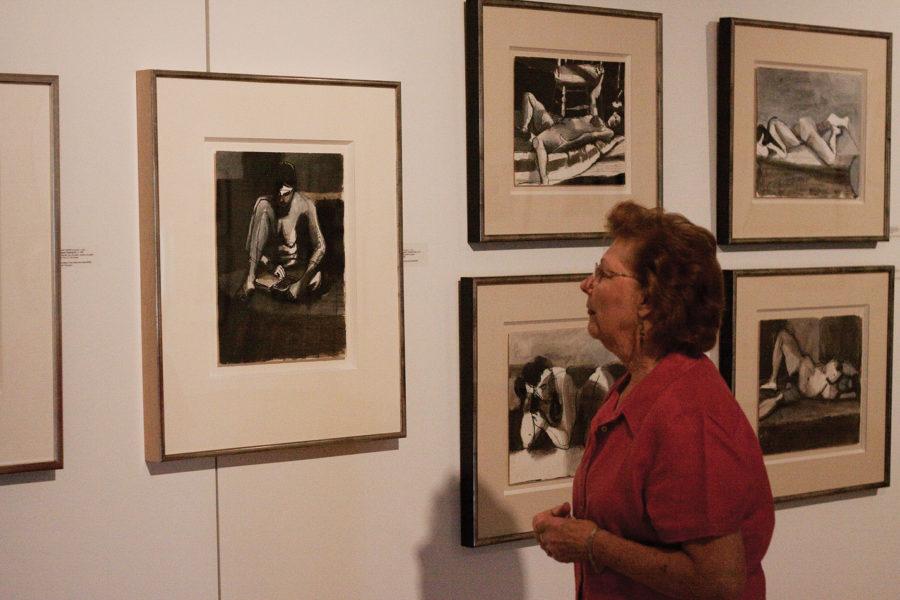University of Iowa exhibit’s controversy interpreted at Iowa State
Photo: Matt Wettengel/Iowa State Daily
Mary de Baca views the Frank Lobdell art exhibit Tuesday in the Campbell Gallery in 1070 Morrill Hall. The exhibit includes paintings of naked women and is on display in the Christian Petersen Art Museum, until Dec. 10.
September 22, 2010
Placement of two nude paintings in administrative buildings at the University of Iowa has aroused controversy, the Iowa City Press-Citizen reported Tuesday. The paintings are part of a student art exhibit, but their display in a public setting brought about a question of appropriateness.
State Senator David Johnson was quoted by the Press-Citizen as referring to “Reclining Nude” as “borderline pornography.”
“I look at a photograph of what’s been displayed and I see very little redeeming value to that painting,” Johnson said. “That particular piece that I was shown certainly isn’t in the classical form.
“I have studied art all through my life, and as I expressed before, that’s borderline pornography, and I don’t think it has any real value,” Johnson said.
On Iowa State’s campus, the current exhibit, “Thursday Night Sessions: Figure Drawings” by Frank Lobdell, located in the Christian Petersen Art Museum, also contains pieces featuring nude women.
John Cunnally, associate professor of art and design, said the difference in styles between the two paintings provide details about their meanings and intentions.
“There are two very different traditions of doing the nude,” Cunnally said. “I mean the U of I painting is very detailed; the student wants to show that he has studied anatomy and that he’s spent a lot of time in the life class getting to know how the nude is shaped and how light affects it from all different directions, whereas Lobdell is trying to really create this sense of energy, life and movement without paying attention to the anatomical details.”
The photorealist style used in one controversial piece, “Reclining Nude” probably explains why it’s been described as being borderline pornographic, Cunnally said, as the painting resembles photographic nudes in magazines like Playboy and Hustler. Cunnally also mentioned that genders portrayed in certain way in paintings have a lot to do with the message they send.
“Normally when you see nude men in art … those don’t cause controversies because there the nudity is a symbol of strength and power, whereas typically when female nudity is shown, the female nude is passive and often shown in a position that one could interpret as a sexual invitation,” Cunnally said. “If [the woman in “Reclining Nudity”] were standing up and lifting dumbbells or wrestling with a lion like Hercules [Senator Johnson] probably wouldn’t have any objections because clearly that’s not any kind of sexual invitation.”
Allison Juull, collections manager and communications coordinator for university museums, said many artists get their formal training from nude drawings, even in the College of Design at Iowa State. Questions of appropriateness are purely opinion-based.
“Appropriate’s up to the viewer,” Juull said. “We don’t presume to censor by any means.”
Juull also said when considering exhibits at the museums on campus they consider their audience, which is ISU students, and what will enhance their aesthetic environment.
“We don’t choose something because it’s racy and suggestive,” Juull said. “We try to think about what the students would be interested in and learn from and that’s part of our mission.”
Despite his personal opposition to the artwork at the University of Iowa, Johnson doesn’t suggest that the legislature ought to act as the art police in instances involving public spaces. He does feel such art brings about the question of whether such displays belong in the halls of a taxpayer supported university.
“That’s going to be up to the university officials and also up to the Board of Regents,” Johnson said. “I believe that leaders shouldn’t shrink from commenting on what’s going on, especially at our Regent universities, which are taxpayer support[ed].”







